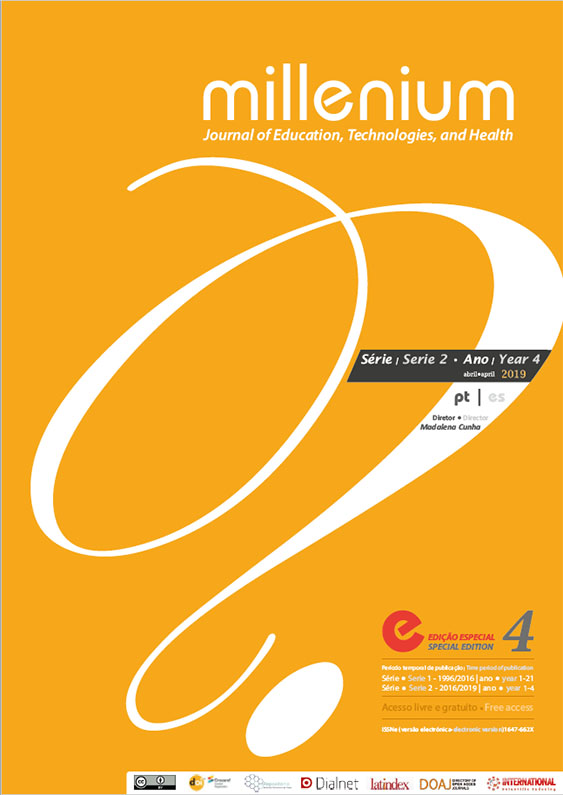Ensinar as línguas estrangeiras no ensino superior na era digital: uma experiência de inovação pedagógica
DOI:
https://doi.org/10.29352/mill024e.14995Keywords:
foreign languages, higher education, digital resources, linguistic realities, professional realitiesAbstract
Introduction: Learning Foreign Languages (FL) in Higher Education does not rest simply upon the transmission of linguistic knowledge. It should also prepare learners for intercultural contact and provide successful and innovative experiences, likely to foster motivation and favour professional placement. Several studies and reports emphasize the importance of FLs for recruitment purposes, the creation of job opportunities requiring responsibility and resulting in higher salaries or career opportunities.
Digital tools, with their easy and quick access, have revolutionized education and created new opportunities and challenges for teaching, namely in higher education. The learning context becomes more dynamic, more closely resembling the work context. The use of the internet and the exploration of online resources are current practices today. In an action-oriented perspective, student acknowledgement of linguistic and professional realities can be fulfilled using social networks and an on demand working method, encouraging them to be active actors who interact within the classroom and outside of it, mobilizing skills acquired in other nuclear Curricular Units (CU) of the course.
Methods: The work experiences hereby presented were conducted in 2016/17 and 2017/18, at ESEV – Higher School of Education of Viseu (Portugal), within a class of second-year Media Studies students attending the CU of "Foreign languages applied to new media and cyberspace", with French and English as target languages taught concomitantly.
Conclusions: The progression of learners is evident through the new ideas that arise and the better organization of the work, the greater ease and accuracy in writing texts and proposing oral productions, attitude in general and the acquisition of more autonomy in the search for development of skills.
Downloads
References
Brudermann, C., & Poteaux, N. (2015). Langues pour étudiants spécialistes d’autres disciplines : de l’amphithéâtre à l’autonomie d’apprentissage. Distances et médiations des savoirs, 9, 1-22. Cao, Y. (2015). Les Tice et l'enseignement-apprentissage du FLE en milieu exolingue : les pratiques dans un département de français en Chine. Alsic, 18, n° 2, 1-9.
Cardoso, J. L., Escária, V., Ferreira, V. S., Madruga, P., Raimundo, A., & Varanda, M. (2012). Empregabilidade e ensino superior em Portugal. Agência de Avaliação e Acreditação do Ensino Superior, A3ES Reading, 5.
Coffey, S. J., & Leung, C. (2015). Creativity in language teaching: Voices from the classroom. In Richards, J. & Jones, R. (Eds.), Creativity and Language Teaching: Perspectives from Research and Practice (pp. 114-129).
London : Routledge. Crinon, J. (2013). Analyse de TIC et métiers de l'enseignement supérieur. Alsic, 16, 1-7.
Delplancq, V., Costa Lopes, A., Oliveira, A., Amante, F., Oliveira, I., Abrantes, J., Jesus Pato, M. L., Amaral, O., Relvas, S., & Fidalgo, S. (2018). Foreign languages and employability: a complex relationship. Case study in the region of Viseu (Portugal), Proceedings of EDULEARN18, pp. 0614-0618.
Lima Ferreira, J., Carpim, L., & Behrens, M. (2017). O professor universitário construindo conhecimentos inovadores para uma prática complexa, colaborativa e dialógica. Revista Diálogo Educacional, 13(38), 69-84.
Lin, C.-H., Warschauer, M., & Blake, R. (2016). Language learning through social networks: Perceptions and reality. Language Learning & Technology, 20(1), 124–147.
Marczyk, G., DeMatteo, D., & Festinger, D. (2005). Essentials of Research Design and Methodology. Hoboken, New Jersey: John Wiley & Sons.
Mondahl, M., & Razmerita, L. (2014). Social media, Collaboration and Social Learning – a Case-study of Foreign Language Learning. The Electronic Journal of e-Learning, 12, Issue 4, 339-352. OCDE (2017). Relatórios económicos da OCDE: Portugal. Paris: OECD Publishing. Tomé, M. (2016). Compétences orales et nouvelles technologies dans un cours de français langue étrangère. Çédille, revista de estudios franceses, 12, 387-401.
Downloads
Published
How to Cite
Issue
Section
License
Copyright (c) 2019 Millenium - Journal of Education, Technologies, and Health

This work is licensed under a Creative Commons Attribution 4.0 International License.
Authors who submit proposals for this journal agree to the following terms:
a) Articles are published under the Licença Creative Commons (CC BY 4.0), in full open-access, without any cost or fees of any kind to the author or the reader;
b) The authors retain copyright and grant the journal right of first publication, allowing the free sharing of work, provided it is correctly attributed the authorship and initial publication in this journal;
c) The authors are permitted to take on additional contracts separately for non-exclusive distribution of the version of the work published in this journal (eg, post it to an institutional repository or as a book), with an acknowledgment of its initial publication in this journal;
d) Authors are permitted and encouraged to publish and distribute their work online (eg, in institutional repositories or on their website) as it can lead to productive exchanges, as well as increase the impact and citation of published work
Documents required for submission
Article template (Editable format)





